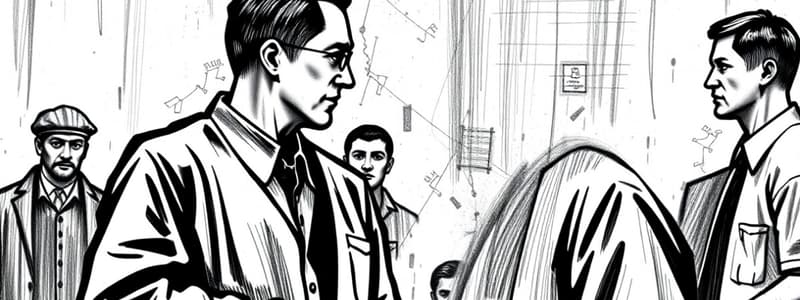Podcast
Questions and Answers
What was the primary focus of Rob Sampson and John Laub's research?
What was the primary focus of Rob Sampson and John Laub's research?
- The impact of technology on crime
- Increased crime rates in urban areas
- Desistance from crime as a process (correct)
- The role of education in preventing delinquency
Turning points in life have no significant impact on criminal behavior.
Turning points in life have no significant impact on criminal behavior.
False (B)
What are the three turning points identified in Sampson and Laub's Age-Graded Theory?
What are the three turning points identified in Sampson and Laub's Age-Graded Theory?
Marriage, meaningful employment, and military service
Glueck and Glueck conducted a study on ______ boys sent to a reform school in the 1930s.
Glueck and Glueck conducted a study on ______ boys sent to a reform school in the 1930s.
Match the following theories to their descriptions:
Match the following theories to their descriptions:
Flashcards
Glueck & Glueck's Study
Glueck & Glueck's Study
A study conducted in the 1930s on 500 boys sent to a reform school, forming the basis for later life-course theories.
Age-Graded Theory of Informal Social Control
Age-Graded Theory of Informal Social Control
This theory explains how changes in social relationships and opportunities over a person's life affect their likelihood of committing crime.
Desistance from Crime
Desistance from Crime
The process of gradually stopping criminal behavior, often influenced by turning points and changing social relationships.
Turning Points
Turning Points
Signup and view all the flashcards
Family's Role in Social Control
Family's Role in Social Control
Signup and view all the flashcards
Study Notes
Glueck and Glueck Study
- Glueck and Glueck studied 500 boys sent to a reform school in the 1930s.
Sampson and Laub's Research
- Sampson discovered Glueck's data in Harvard Law School.
- Developed the "Age-graded theory of informal social control."
- Argued desistance from crime is a process, not an event.
Social Control Theory
- Draws heavily on Hirschi's social control theory.
- Informal social control explains changes in criminal behavior over a lifespan.
Turning Points
- Turning points—marriage, meaningful employment, and military service—cause gradual changes in social control and opportunities.
Family's Role
- Family plays a significant role in controlling behavior.
- Exercise both relational control (attachment) and instrumental control (supervision).
Studying That Suits You
Use AI to generate personalized quizzes and flashcards to suit your learning preferences.
Description
Explore the findings of Glueck and Glueck, along with Sampson and Laub's contributions to social control theory. Delve into how informal social control influences criminal behavior throughout life and the role of turning points and family in this dynamic process.




